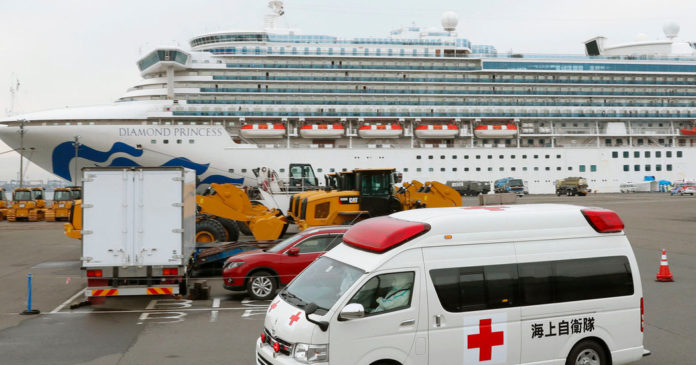YOKOHAMA, Japan — The United States will evacuate Americans from the cruise ship that has been quarantined for more than a week in Japan because of coronavirus infections on board, the United States Embassy in Tokyo said on Saturday.
A chartered flight will arrive on Sunday for those who want to return to the United States, according to a letter from the embassy emailed to American passengers and crew members. Hundreds of Americans are on the ship.
“We recognize this has been a stressful experience, and we remain dedicated to providing all the support we can and seeing you safely and expeditiously reunited with family and friends in the United States,” the letter read.
[Read the latest updates on the coronavirus outbreak here. ]
The ship, the Diamond Princess, was placed under quarantine at the city of Yokohama early last week, with about 3,700 passengers and crew members aboard, after the coronavirus was diagnosed in a man who had disembarked days earlier in Hong Kong.
Since the quarantine was imposed, at least 285 coronavirus cases have been confirmed aboard the 17-deck luxury ship — including 67 announced on Saturday, the most reported in a single day since the quarantine began.
Many passengers have expressed fear that the quarantine, meant to protect Japan and keep the virus from spreading, was putting them at risk. Experts have said that infections could have spread aboard the ship despite measures taken to isolate people.
The embassy said buses would move Americans and their belongings from the ship to the chartered plane on Sunday, and that evacuees would be screened for symptoms before boarding. The plane will land at Travis Air Force Base in California, with some passengers continuing onward to Lackland Air Force Base in Texas.
The evacuated Americans will then have to undergo two weeks of additional quarantine. “We understand this is frustrating and an adjustment, but these measures are consistent with the careful policies we have instituted to limit the potential spread of the disease,” the letter read.
That news dismayed some of the Americans on the ship. Linda Tsukamoto, a retired retail manager from Marina Del Rey, Calif., noted that the State Department had previously said there would be no secondary quarantine.
She said she was considering turning down the embassy’s offer and waiting for the original quarantine period to expire. “I don’t want to break quarantine so I can go to a cold barracks to end up quarantined again,” she said.
The embassy said those who chose not to take the flight would be “unable to return to the United States for a period of time,” though it did not specify how long, saying the Centers for Disease Control and Prevention would decide the timeline. Symptomatic Americans who cannot board the flight will remain in Japan for care, the embassy said.
At least 40 Americans have already been taken off the ship after testing positive for the virus. Americans were asked to notify the embassy if they wanted to travel with immediate family members who were not United States citizens.
The Wall Street Journal first reported that the government was preparing to evacuate Americans.
Japan has more confirmed coronavirus cases — the vast majority from the Diamond Princess — than any country outside China, where the outbreak began, and it reported its first death from the virus on Thursday.
On Friday, the Japanese government said an official who had helped transfer infected patients from the cruise ship had tested positive for the virus. A Health Ministry official who had been tending to passengers on board also tested positive. On Saturday, the government announced 11 other cases that it said were not connected to the cruise ship.
At a news briefing on Friday, an official with the C.D.C., Dr. Nancy Messonnier, said officials were discussing a plan to ensure the safety of the Americans on the ship.
“It’s really important to all of us that these people are safe and taken well care of,” Dr. Messonnier said. “We are also concerned that the data coming out of Japan suggests there’s a higher risk among the people on the ship, and therefore their safety is of utmost importance.”
On Saturday, before the embassy announced the evacuation plan, Americans were waiting anxiously for confirmation of news reports about it. One said the ship felt like a “pressure cooker.”
Sarah Arana, a medical social worker from Paso Robles, Calif., said Americans were particularly worried about the extra quarantine period in the United States. “If you add two weeks and we have to miss work, what does that mean for us?” she asked.
But Ms. Arana, a grandmother of two, said she was prepared to submit to it, out of concern that the virus had spread on the ship since the quarantine was imposed.
“If we can prevent this from spreading any further, then I am OK and I will go sit in a military base for two weeks so I don’t become a superspreader,” she said. “I feel like I have some civic responsibility.”
Ms. Tsukamoto was more inclined to stay on the ship, where she said quarantine had been “like going through an emergency in a five-star hotel.”
Watching the sun set over Yokohama Bay from her window, she said, “My view from Travis Air Force Base will not be like this.”
Eimi Yamamitsu contributed reporting from Yokohama and Makiko Inoue from Tokyo.
Source : Nytimes












